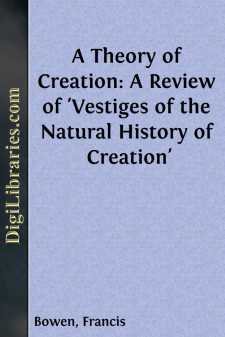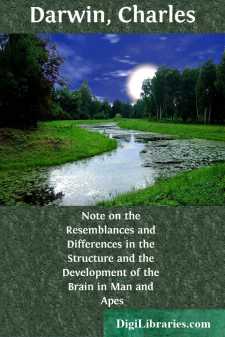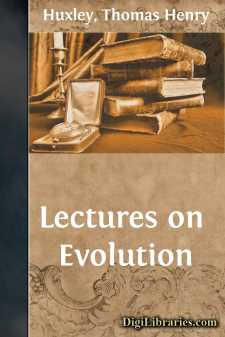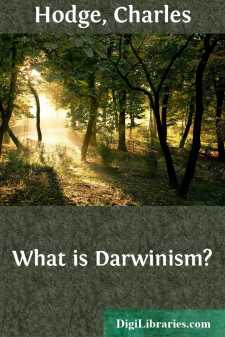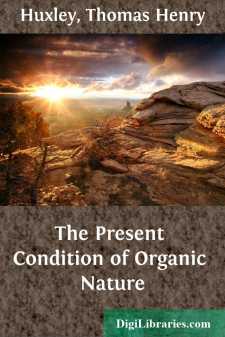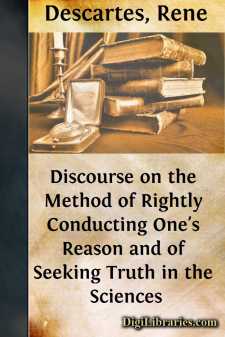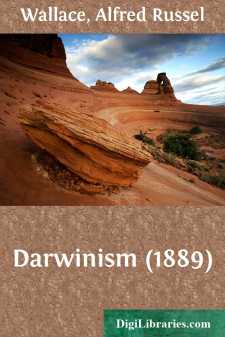Science
- Astronomy 18
- Biology 40
- Chemistry 13
- Electricity 1
- General 38
- History 6
- Light 1
- Paleontology 2
- Philosophy & Social Aspects 1
- Physics 3
- Relativity 2
- Study & Teaching 1
- Waves & Wave Mechanics 1
Science Books
Sort by:
by:
Francis Bowen
THEORY OF CREATION. Vestiges of the Natural History of Creation. New York: Wiley & Putnam. 1845. 12mo. pp. 291. This is one of the most striking and ingenious scientific romances that we have ever read. The writer of it is a bold man; he has undertaken to give a hypothetical history of creation, beginning, as the title-pages say, at the earliest period, and coming down to the present day. It is not...
more...
by:
Charles Darwin
The controversy respecting the nature and the extent of the differences in the structure of the brain in man and the apes, which arose some fifteen years ago, has not yet come to an end, though the subject matter of the dispute is, at present, totally different from what it was formerly. It was originally asserted and re-asserted, with singular pertinacity, that the brain of all the apes, even the...
more...
I. THE THREE HYPOTHESES RESPECTING THE HISTORY OF NATURE We live in and form part of a system of things of immense diversity and perplexity, which we call Nature; and it is a matter of the deepest interest to all of us that we should form just conceptions of the constitution of that system and of its past history. With relation to this universe, man is, in extent, little more than a mathematical point;...
more...
In the course of the present year several foreign commentaries upon Mr. Darwin's great work have made their appearance. Those who have perused that remarkable chapter of the 'Antiquity of Man,' in which Sir Charles Lyell draws a parallel between the development of species and that of languages, will be glad to hear that one of the most eminent philologers of Germany, Professor...
more...
by:
Charles Hodge
WHAT IS DARWINISM? This is a question which needs an answer. Great confusion and diversity of opinion prevail as to the real views of the man whose writings have agitated the whole world, scientific and religious. If a man says he is a Darwinian, many understand him to avow himself virtually an atheist; while another understands him as saying that he adopts some harmless form of the doctrine of...
more...
by:
William Crookes
THE CHEMICAL HISTORY OF A CANDLE LECTURE I. A CANDLE: THE FLAME—ITS SOURCES—STRUCTURE—MOBILITY—BRIGHTNESS. I purpose, in return for the honour you do us by coming to see what are our proceedings here, to bring before you, in the course of these lectures, the Chemical History of a Candle. I have taken this subject on a former occasion; and were it left to my own will, I should prefer to repeat...
more...
by:
Grant Allen
FALLING IN LOVE An ancient and famous human institution is in pressing danger. Sir George Campbell has set his face against the time-honoured practice of Falling in Love. Parents innumerable, it is true, have set their faces against it already from immemorial antiquity; but then they only attacked the particular instance, without venturing to impugn the institution itself on general principles. An old...
more...
THE PRESENT CONDITION OF ORGANIC NATURE. When it was my duty to consider what subject I would select for the six lectures [*To Working Men, at the Museum of Practical Geology, 1863.] which I shall now have the pleasure of delivering to you, it occurred to me that I could not do better than endeavour to put before you in a true light, or in what I might perhaps with more modesty call, that which I...
more...
by:
Rene Descartes
PART I Good sense is, of all things among men, the most equally distributed; for every one thinks himself so abundantly provided with it, that those even who are the most difficult to satisfy in everything else, do not usually desire a larger measure of this quality than they already possess. And in this it is not likely that all are mistaken the conviction is rather to be held as testifying that the...
more...
WHAT ARE "SPECIES," AND WHAT IS MEANT BY THEIR "ORIGIN" Definition of species—Special creation—The early Transmutationists—Scientific opinion before Darwin—The problem before Darwin—The change of opinion effected by Darwin—The Darwinian theory—Proposed mode of treatment of the subject. The title of Mr. Darwin's great work is—On the Origin of Species by means of...
more...


